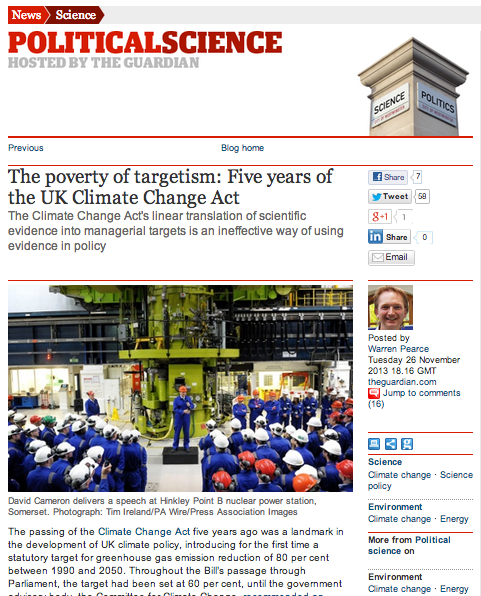November 27, 2013, by Warren Pearce
Climate change targetism: scientific numbers, managerial policy
 It is five years since the Climate Change Act was given Royal Assent. This groundbreaking piece of legislation provided a huge boost to environmental campaigners who had long campaigned for government to make such a move. It also denoted a key stage in David Cameron’s ‘detoxification’ strategy of the Conservative Party while in opposition, as both he and George Osborne pushed the Labour Government to pass the legislation with stringent targets for emission cuts. To mark the anniversary, the Guardian’s Political Science blog yesterday published posts by Friends of the Earth’s Mike Childs, UK Energy Research Centre’s Jim Watson and Exeter University’s Catherine Gapper examining various aspects of the Act’s development and implementation.
It is five years since the Climate Change Act was given Royal Assent. This groundbreaking piece of legislation provided a huge boost to environmental campaigners who had long campaigned for government to make such a move. It also denoted a key stage in David Cameron’s ‘detoxification’ strategy of the Conservative Party while in opposition, as both he and George Osborne pushed the Labour Government to pass the legislation with stringent targets for emission cuts. To mark the anniversary, the Guardian’s Political Science blog yesterday published posts by Friends of the Earth’s Mike Childs, UK Energy Research Centre’s Jim Watson and Exeter University’s Catherine Gapper examining various aspects of the Act’s development and implementation.
As part of the series, I take a critical look at the Act as part of the evolving trend of ‘targetism’ in public policy. The poverty of targetism: Five years of the UK Climate Change Act draws on literature from Amanda Machin and Christopher Hood, as well as my own research into local climate change policy, I argue that the Act uses scientific evidence for managerial ends. In doing so, it has sought to be scientifically robust, but risks being politically brittle. While scientific evidence is vital in identifying the physical processes of climate change, making this evidence so central to the legislation presents an illusion of consensus upon which to base policy, risking the Act becoming increasingly irrelevant as political support withers away.
All comments welcome, but please leave them under the full post at the Guardian.

[…] Warren began his blogging year with a reflection on the fall-out from Hurricane Sandy which had hit New York the autumn before and what this meant for public understanding of science and weather. Warren explored this topic further in the context of the still rumbling climategate affair. Several posts on climate skepticism elicited lively responses, such as this one on the use of the term deniers and the closing down of the debate, this one on families of scepticism, even more so this one asking the provocative question as to whether climate sceptics are champions of real science, and most of all a comment piece on a controversial article entitled the ‘subterranean war on science’. Warren also critically assessed a famous metaphor used to communicate the rise of greenhouse gas emissions and their impact on the climate, namely the Hiroshima bomb metaphor. He also wrote posts on issues related to the IPCC and climate sensitivity, climate change as a global and local issue, and climate change and targetism. […]